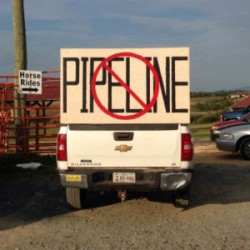
The pronouncement is in a policy statement released today by the Allegheny-Blue Ridge Alliance (ABRA), a coalition of groups formed last September to address concerns about the proposed pipeline project. All of the signatory organizations are members of ABRA.
The policy states that the routes that have been announced as under consideration by Dominion Resources and its partners in the ACP “are not in the best interest of the public good of the affected communities and citizens of Virginia and West Virginia.”
Among the reasons for opposition cited in the policy are that the proposed routes would:
- Threaten the integrity and safety of the water supplies of the immediately affected communities and many other communities that are dependent upon water originating in the Allegheny-Blue Ridge region;
- Present serious safety risks because of the proven instability of the karst topography which these proposed routes would traverse;
- Endanger the structural character and seriously increase the possibility of long-term erosion in the steep mountain terrain through which the routes would pass;
- Harm the habitat of many protected species of plants and animals that are unique to the Allegheny-Blue Ridge region; and
- Compromise the intended uses of public lands, particularly the Monongahela and George Washington National Forests, the Blue Ridge Parkway and the Appalachian National Scenic Trail.
The policy also calls upon the Federal Energy Regulatory Commission, which has regulatory authority over the construction and operation of interstate natural gas pipelines, to:
- Conduct a programmatic Environmental Impact Statement that assesses the full range of adverse effects of the pipeline and evaluates all reasonable, less damaging alternatives;
- Investigate the demand for more natural gas in the markets that the ACP would reportedly serve and the need for a new pipeline to meet that demand, given that recent credible studies have concluded that the existing pipeline infrastructure may be adequate; and
- Evaluate the expected life of the Marcellus shale field since recent analyses have predicted that production from the field will soon begin to decline.










